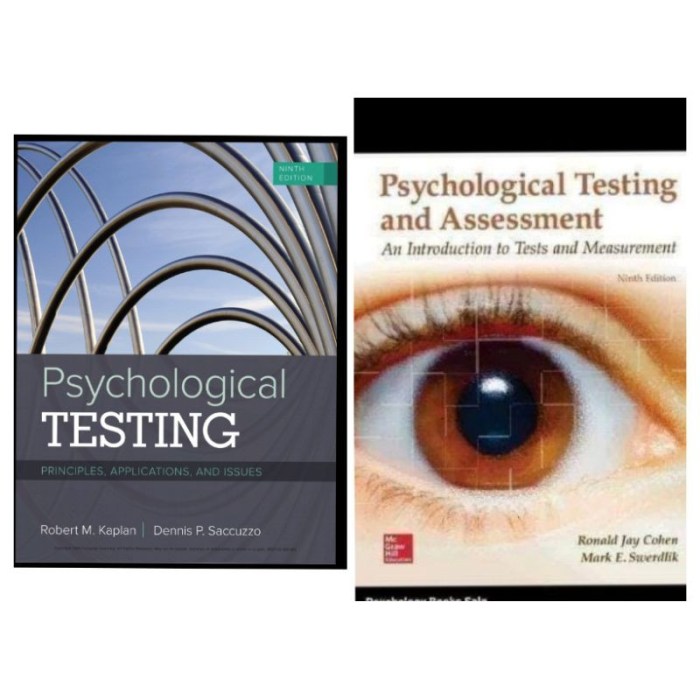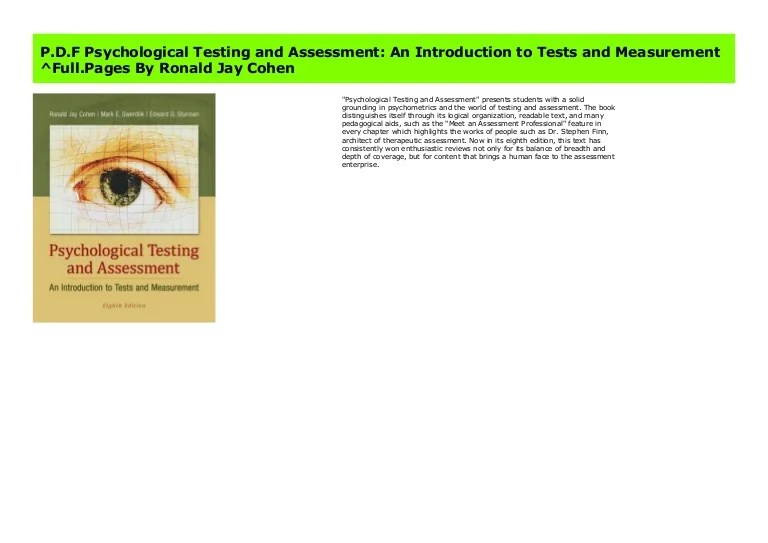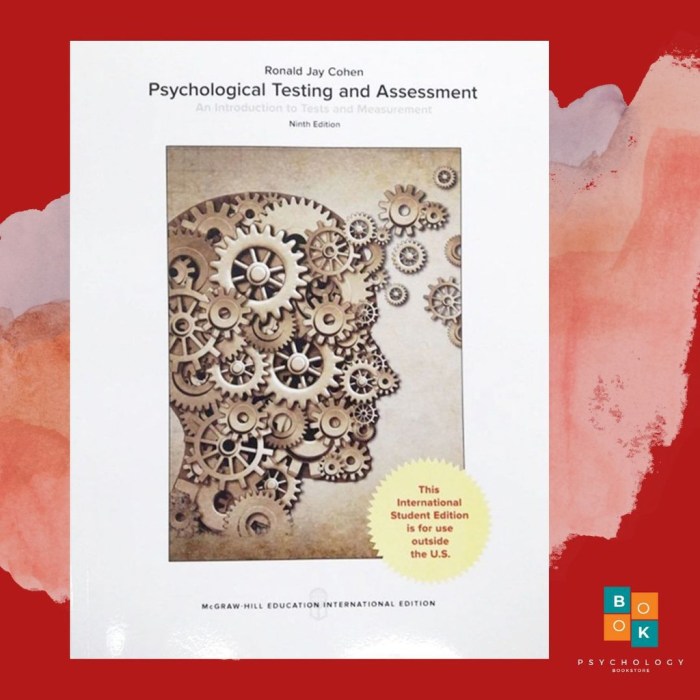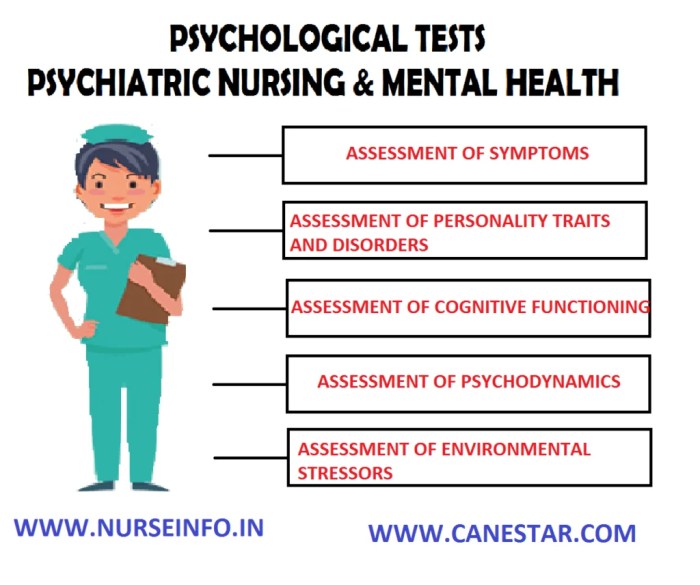Psychological testing and assessment 10th edition – In the realm of psychology, the advent of Psychological Testing and Assessment, 10th Edition marks a significant milestone. This comprehensive guidebook unveils the intricacies of psychological testing, tracing its historical evolution and exploring its multifaceted applications. As we delve into the pages of this esteemed publication, we embark on a journey that illuminates the ethical considerations, diverse test types, and rigorous validation processes that shape the field.
From the administration and interpretation of tests to their profound impact on various psychological domains, this 10th edition serves as an invaluable resource. It empowers practitioners with the knowledge and skills to navigate the complexities of psychological testing, ensuring the ethical and effective use of these powerful tools.
Introduction: Psychological Testing And Assessment 10th Edition

Psychological testing and assessment, as Artikeld in the 10th edition of this seminal work, is a crucial aspect of the field of psychology. It provides invaluable tools and techniques for evaluating an individual’s cognitive, emotional, and behavioral characteristics. This edition builds upon the rich history and foundational principles of the field, while incorporating cutting-edge advancements and emerging trends.
The historical evolution of psychological testing and assessment methods has witnessed significant milestones, from the early development of intelligence tests to the advent of more sophisticated and specialized assessments. These advancements have expanded the scope of psychological testing, enabling practitioners to delve deeper into the complexities of human behavior and mental processes.
Ethical Considerations
Ethical guidelines are paramount in the conduct of psychological testing and assessment. The 10th edition emphasizes the importance of informed consent, ensuring that individuals fully understand the purpose, procedures, and potential implications of the assessment before participating.
Confidentiality is another ethical cornerstone. Test results and personal information must be handled with the utmost care and discretion to protect the privacy and well-being of individuals. Cultural sensitivity is also crucial, as tests should be administered and interpreted with an understanding of the cultural context and potential biases that may arise.
The ethical implications of using psychological tests for various purposes are carefully considered. Tests should be used appropriately and for their intended purposes, with due regard for the potential impact on individuals and society as a whole.
Types of Psychological Tests
Psychological tests can be categorized into various types based on their purpose and methods. Intelligence tests, for example, measure cognitive abilities such as problem-solving, reasoning, and verbal comprehension. Personality tests assess traits, dispositions, and behavioral tendencies.
Projective tests, such as the Rorschach Inkblot Test, elicit responses that provide insights into unconscious thoughts and feelings. Neuropsychological tests evaluate cognitive functioning and brain damage, often in the context of neurological disorders or injuries.
Each type of test has its own strengths and limitations, and the choice of test depends on the specific purpose and characteristics of the individual being assessed.
Test Development and Validation
The development and validation of psychological tests is a rigorous process. Reliability, validity, and standardization are key concepts in ensuring the accuracy and fairness of tests.
Reliability refers to the consistency of test results over time and across different examiners. Validity assesses the extent to which a test measures what it claims to measure. Standardization involves establishing clear and consistent procedures for administering, scoring, and interpreting tests.
Various methods are employed to establish test reliability and validity, including statistical analyses, item analysis, and expert reviews.
Test Administration and Interpretation
Proper procedures for administering and scoring psychological tests are essential to ensure accurate and reliable results. The examiner plays a crucial role in establishing a rapport with the test-taker and creating a comfortable and supportive testing environment.
Test interpretation involves drawing meaningful conclusions from test results. This requires a thorough understanding of the test, its psychometric properties, and the individual’s background and context. Interpreters must consider multiple factors and avoid making hasty or biased judgments.
Applications of Psychological Testing and Assessment
Psychological testing and assessment find widespread applications in various settings, including clinical psychology, educational psychology, forensic psychology, and industrial-organizational psychology.
In clinical psychology, tests are used to diagnose mental health disorders, assess treatment progress, and develop personalized interventions. In educational psychology, tests help identify learning disabilities, assess cognitive strengths and weaknesses, and guide educational planning.
Forensic psychology utilizes tests to evaluate competency, assess risk, and provide expert testimony in legal proceedings. Industrial-organizational psychology employs tests for employee selection, performance evaluation, and career development.
Emerging Trends and Future Directions, Psychological testing and assessment 10th edition
Psychological testing and assessment are constantly evolving, with new technologies and methodologies emerging. The use of computer-based testing, adaptive testing, and artificial intelligence is gaining traction, offering increased efficiency and personalized assessments.
Future directions for the field include the development of more culturally sensitive and inclusive tests, the integration of neuroimaging techniques, and the exploration of new assessment methods for emerging psychological constructs.
FAQs
What are the key ethical considerations in psychological testing?
Informed consent, confidentiality, and cultural sensitivity are paramount ethical guidelines in psychological testing.
How are psychological tests validated?
Reliability, validity, and standardization are crucial aspects of test validation, ensuring the accuracy and consistency of test results.
What are the different types of psychological tests?
Intelligence tests, personality tests, projective tests, and neuropsychological tests represent diverse categories of psychological tests, each with unique purposes and strengths.


